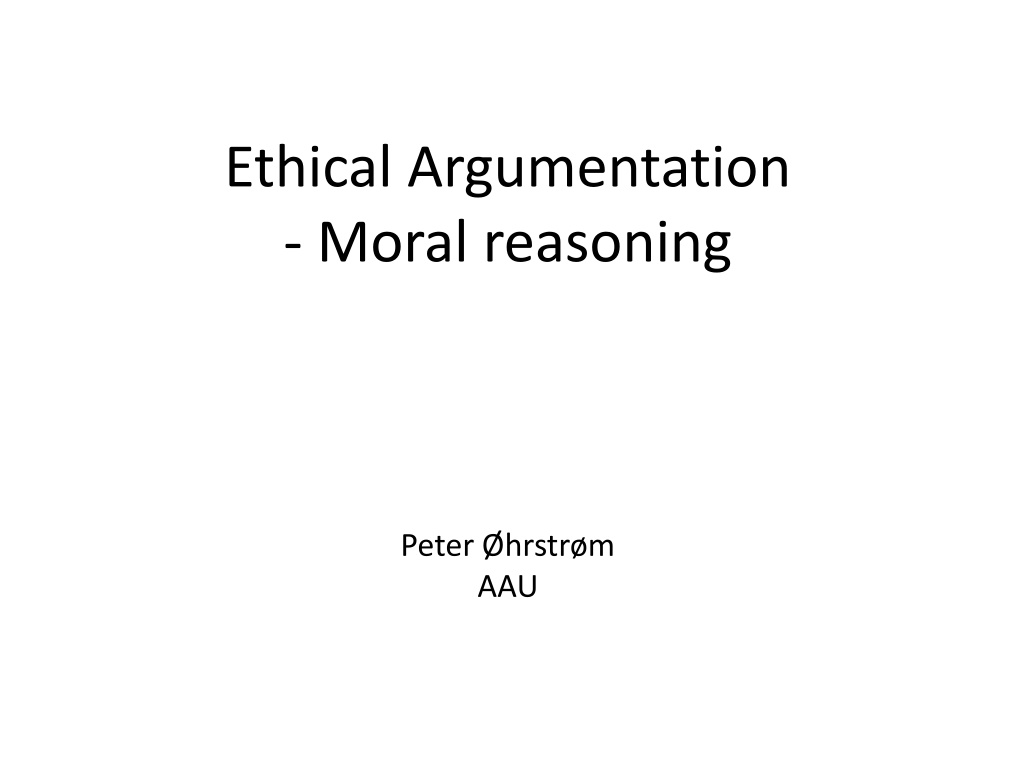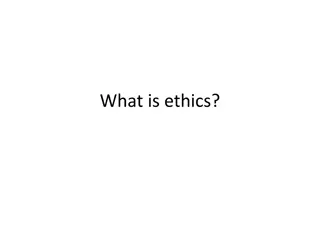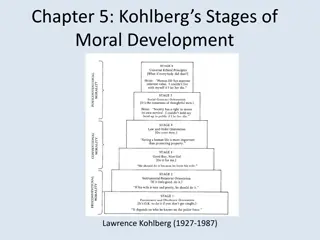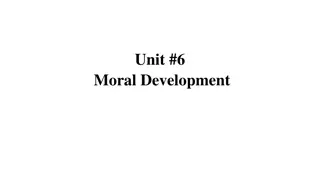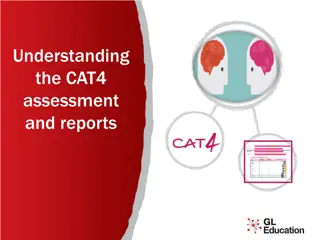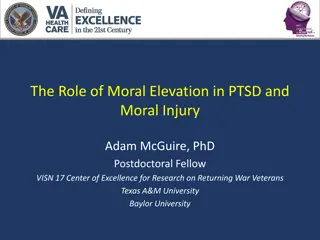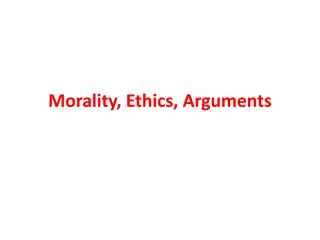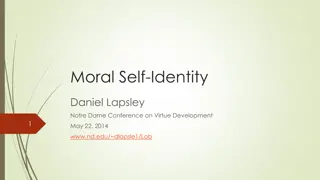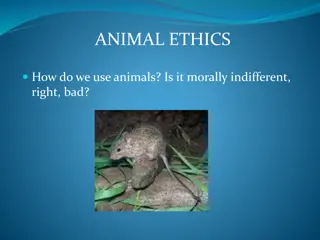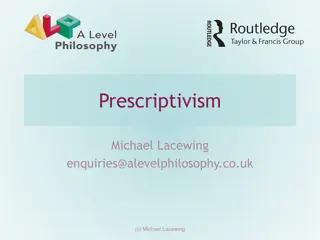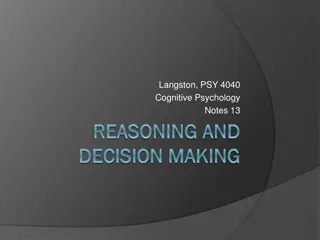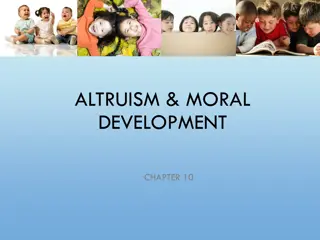Forms of Moral Reasoning and Ethics in Decision-Making
Explore the main forms of moral reasoning in ethical decision-making, including virtue ethics, deontological reasoning, and teleological reasoning. Understand the importance of developing ethical virtues and principles in guiding behavior. Delve into examples of reasoning from virtue and deontological perspectives, examining the moral and ethical implications of actions based on character traits and rules. Consider the intersection of moral and legal laws in ethical frameworks.
Download Presentation

Please find below an Image/Link to download the presentation.
The content on the website is provided AS IS for your information and personal use only. It may not be sold, licensed, or shared on other websites without obtaining consent from the author.If you encounter any issues during the download, it is possible that the publisher has removed the file from their server.
You are allowed to download the files provided on this website for personal or commercial use, subject to the condition that they are used lawfully. All files are the property of their respective owners.
The content on the website is provided AS IS for your information and personal use only. It may not be sold, licensed, or shared on other websites without obtaining consent from the author.
E N D
Presentation Transcript
Ethical Argumentation - Moral reasoning Peter hrstr m AAU
The Main Forms of Moral Reasoning 1) Reasoning from Virtue: Ontological Reasoning 2) Reasoning from Rules: Deontological Reasoning 3) Reasoning from Consequences: Teleological Reasoning
Reasoning from Virtue: Ontological Reasoning In my life I should focus more on my ethical character and general behaviour as such than on particular acts. It is important to develop ethical qualities, virtues. Aristotle (384-322 B.C.) Much Christian thinking in Europe.
Reasoning from Virtue: Ontological Reasoning The cardinal virtues 1. Prudence 2. Justice 3. Temperance 4. Courage 5. Faith 6. Hope 7. Love Aristotle (384-322 B.C.) Much Christian thinking in Europe.
BJ. Fogg Designers should be responsible and hopefully even praiseworthy in their work. What does that mean?
Major premise: I aspire to be an honest person, I hate the idea of being a thief. Minor premise: Taking this necklace makes me a thief. Conclusion: Therefore I may not take this necklace. Reasoning from Virtue
Major premise: Thou shalt not steal. Minor premise: To take this necklace would be stealing. Conclusion: Thou (in this case, I) may not take the necklace. Deontological Reasoning
Deontological Reasoning Here ethics is cased on a set of laws or commandments (i.e. the 10 commandments). E.g. Thou shalt not kill Thou shalt not steal The great commandment: Love your neighbour as yourself. Relation between moral and legal laws?
The first formulation of the Categorical Imperative : "Act only in accordance with that maxim through which you can at the same time will that it become a universal law." This formulations appears similar to The Golden Rule: 1) "Do not impose on others what you do not wish for yourself." 2) "Treat others how you wish to be treated". Immanuel Kant (1724-1804)
A.N. Prior discussed the logical machinery involved in the theoretical derivation of obligation. He wanted to find what he called The Logic of Obligation . Prior claimed that such logical system had to be based on complete descriptions of (a) the actual situation, and (b) the relevant general moral rules. Arthur Norman Prior (1914-69)
~A not permitted ~A forbidden A obligatory A not permitted A forbidden ~A obligatory ~P~A OA ~PA O~A A permitted A not forbidden ~A not obligatory ~A permitted ~A ikke forbidden A not obligatory PA ~O~A P~A ~OA
A.N. Prior discussed the logical machinery involved in the theoretical derivation of obligation. He wanted to find what he called The Logic of Obligation . Prior claimed that such a logical system had to be based on complete descriptions of (a) the actual situation, and (b) the relevant general moral rules. Prior s fundamental creed regarding deontic logic: ... our true present obligation could be automatically inferred from (a) and (b) if complete knowledge of these were ever attainable (Prior 1949) This makes the idea of a full deontic system rather unrealistic!
Deontological Reasoning - dilemmas Ex: Jews hidden in the attic & Gestapo asking questions at the door. Ex: In some case you may only be able to feed you children if you steal.
Major premise: If everyone took objects that don't belong to them, all trust in institutions would break down and the economy would collapse; therefore the practice of unauthorized taking objects is contrary to the greatest good of the society; Minor premise: Taking this necklace in these circumstances would therefore be contrary to the greatest good of the society; Conclusion: This act is not right and I should not do it. Reasoning from Consequences
Reasoning from Consequences (utilitarism) This means that you should do what leads to greatest happiness of the greatest number of persons in society. John Stuart Mill (1806-73) Problems: 1) What units should be used? 2) Who should be included in the calculation?
BJ Foggs diagram: If the Outcome Intended Unintended is Not reasonably predictable Reasonably predictable and Ethical Unethical Ethical Unethical Ethical Unethical and then the desig- ner is Respon- sible and at fault Not respon- sible Respon- sible and at fault Not Praise- worthy Respon- sible and at fault respon- sible
A.N. Priors criticism of consequentialism. G.E. Moore s definition of duty in Principia Ethica : Duty is that action which, of all the alternatives open to us, will have the best total consequences. A.N. Prior (1914-69)
Priors main criticism of Moores definition: Then there may indeed be a number of alternative actions which we could perform on a given occasion, but none of these actions can be said to have any total consequences , or to bring about a definite state of the world which is better than any other that might be brought about by other choices. For we may presume that other agents are free beside the one who is on the given occasion deciding what he ought to do, and the total future state of the world depends on how these others choose as well as on how the given person chooses [Prior 1968, p.51]
For want of a nail The shoe was lost; For want of a shoe The horse was lost; For want of a horse The rider was lost; For want of a rider The battle was lost; For want of a battle The kingdom was lost; And all for the want Of a horse-shoe nail. A.N. Prior (1914-69)
Priors main criticism of Moores definition: Then there may indeed be a number of alternative actions which we could perform on a given occasion, but none of these actions can be said to have any total consequences , or to bring about a definite state of the world which is better than any other that might be brought about by other choices. For we may presume that other agents are free beside the one who is on the given occasion deciding what he ought to do, and the total future state of the world depends on how these others choose as well as on how the given person chooses [Prior 1968, p.51]
Jim comes across 20 innocent prisoners about to be executed. Their captor says that if Jim will shoot one of the prisoners, he will let the rest of them go free. Jim dislikes this idea, but the prisoners are begging him to accept. What should he do? Bernard Williams (1929-2003)
Deontological Reasoning Reasoning from Consequences Reasoning from Virtue
Ethics Utilitarianism: Analysis of consequences
Ethics Utilitarianism: Analysis of consequences Deontology: Analysis of rules of obligation.
Ontology: Analysis of the concrete situation. Ethics Utilitarianism: Analysis of consequences Deontology: Analysis of rules of obligation.
Ethical questions concerning data collection: In which cases is it ethically acceptable to develop/use flying robots that can perform various kinds of surveillance and data collection in specific contexts? Is it ethically acceptable the collect person sesitive data without obtaining informed consent? If so, who should be allowed to do it? To what extent should the individual be able to claim privacy? In which cases should we use informed consent? In which cases should we use ethical boards or panels?
Surveillance in domotics Surveillance in health care (EPR). Surveillance in searching Surveillance and metadata Etc. How can be deal with the problem that the use of data extracted from databases is sometime caught between the societal right to know and the individual right to private life ?
